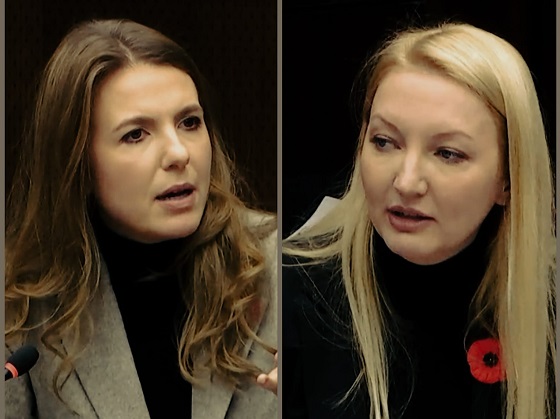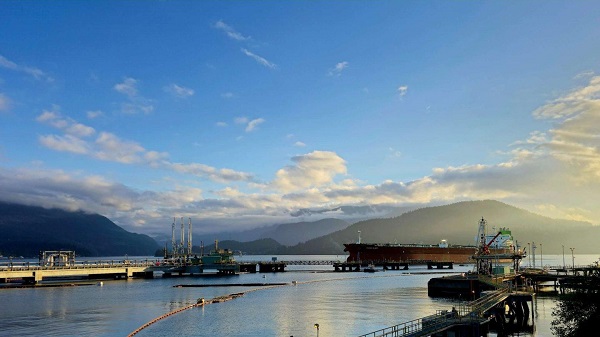National
Committee Hearing Exposes Trudeau’s Political Spin on Foreign Interference

In a Circus of Leaks, Double Standards, and Evasions, Conservatives Call Out the Trudeau Government for Putting International Optics Over Canadian Sovereignty
In Canada’s recent hearing with the Standing Committee on Public Safety and National Security (SECU) on alleged interference by Indian government-linked agents, what should have been a serious inquiry into national security turned into a Liberal-led circus of deflections, double standards, and selective outrage. The Trudeau government trotted out high-ranking officials—representatives from CSIS, the RCMP, the Privy Council Office, and Global Affairs Canada—who were there to answer for the alleged interference tactics targeting Canadians. And to top it off, they were asked why, instead of informing Canadians directly, they’d chosen to leak the intel to The Washington Post. Why were Canadians the last to know about threats on their own soil? And why did a foreign newspaper get the scoop on a story affecting Canadian sovereignty?
At issue were allegations that Indian agents had been involved in intimidation tactics and organized criminal activities targeting Canada’s Sikh community, particularly those sympathetic to the separatist movement. The committee also questioned why the Trudeau government’s response has been to selectively leak this information to American media, while keeping Canadians in the dark about similar threats from other foreign governments—particularly China.
The Leaks to The Washington Post: Information for Foreign Press, Silence for Canadians
Instead of informing Canadians directly, the Trudeau government decided it was a better idea to leak details about alleged Indian interference to The Washington Post, claiming it was to combat “misinformation” internationally. Let’s pause for a moment—this is Canada we’re talking about, and the government feels it’s necessary to share news about threats to Canadians with foreign media instead of Canadians themselves. That selective leak didn’t go unnoticed by Conservative MPs, especially Raquel Dancho. Dancho took the PCO to task, asking why, when it’s Indian interference, they rush to get the word out to American media, but when it comes to Chinese interference, they hide behind “national security.” Canadians watching this hearing saw the hypocrisy plain as day.
Then enter Jennifer O’Connell. She wasn’t there to press for answers—she was there to protect the government narrative. Instead of holding the PCO accountable, O’Connell fed them a lifeline with soft, scripted questions. She was practically giving them cue cards. She asked them to “explain” the reasoning behind the leak to The Washington Post, letting the PCO offer up the excuse of “controlling the narrative.” Controlling the narrative? You don’t say. Jennifer O’Connell might as well have been reading from a Liberal Party talking points memo, trying to dress up a blatant international PR stunt as a move to protect Canadians.
But here’s where it falls apart. Dancho’s challenge was clear: if the Trudeau government had no problem leaking intel on India to The Washington Post, why do they stay silent on the Chinese interference claims that have rocked our elections? Why are Canadians kept in the dark when it doesn’t suit the Liberals’ image? This isn’t national security; this is political convenience, plain and simple.
Conservatives Call Out Liberal Spin and Selective Transparency
Raquel Dancho didn’t mince words, asking why the government leaks intelligence on Indian interference to American media yet hides CCP-related interference under a “national security” guise.
“I wish that the Liberal members would apply that same energy to holding their own Prime Minister accountable for failing to stop interference into our elections,”
She said, calling out the hypocrisy point-blank. Dancho’s comments exposed the Liberals’ inconsistent approach to foreign interference and questioned why the government continues to treat Canadians like afterthoughts.
Glen Motz zeroed in on the glaring gaps in Canada’s vetting process for foreign diplomats, particularly those from India. He pointed out that expelling diplomats means nothing if their replacements are allowed to enter without adequate security checks. Motz’s questions cut to the core of the Liberals’ “tough on interference” stance, revealing it as hollow when diplomats allegedly linked to interference can come and go unchecked.
Dane Lloyd challenged the government’s decision to leak information to The Washington Post rather than informing Canadians directly, highlighting a fundamental question: Why does the Canadian government prioritize international press over its own people? His frustration echoed what many Canadians feel—that their government is more interested in protecting its image on the world stage than ensuring Canadian sovereignty and safety.
The Bottom Line
This SECU Committee hearing confirmed the worst fears of Canadians: the Trudeau government is more interested in international optics than national security. The Liberals pick and choose which foreign threats to publicize, conveniently spinning some stories while keeping others under wraps—all based on what best serves their political agenda. If this is the government’s idea of protecting Canadian sovereignty, it’s no wonder Canadians are left questioning their safety.
And here’s where the Liberal hypocrisy hits new lows: instead of owning up to their failures, they tried to spin it, suggesting that Pierre Poilievre is somehow responsible for the foreign interference threats that have emerged on Trudeau’s watch. But let’s be real—if the Liberals had names of Conservative collaborators in interference plots, we all know they would be the first to name or leak them to the press. Instead, the Privy Council Office’s actions and The Washington Post leak were backed by none other than Trudeau’s own Prime Minister’s Office.
Conservatives like Raquel Dancho, Glen Motz, and Dane Lloyd came prepared to call out this hypocrisy. They demanded transparency and accountability—the very things Trudeau’s government seems reluctant to provide. This wasn’t a hearing on foreign interference; it was an exposé on the Trudeau government’s shameless double standards and lack of genuine concern for Canadian sovereignty.
In Canada’s darkest hours, when it comes to defending our sovereignty, it’s clear that it’s the Conservatives—not the Liberals—who are standing up for Canadians, demanding the truth, and holding this government to account. Trudeau’s Liberals have shown they’ll trade Canadian security for political optics, undermining everything Canada stands for. And Canadians deserve so much better.
Invite your friends and earn rewards
Business
Oil tanker traffic surges but spills stay at zero after Trans Mountain Expansion

From the Canadian Energy Centre
Bigger project maintains decades-long marine safety record
The Trans Mountain system continues its decades-long record of zero marine spills, even as oil tanker traffic has surged more than 800 per cent since the pipeline’s expansion in May 2024.
The number of tankers calling at Trans Mountain’s Westridge Marine Terminal in the Port of Vancouver in one month now rivals the number that used to go through in one year.
A global trend toward safer tanker operations
Trans Mountain’s safe operations are part of a worldwide trend. Global oil tanker traffic is up, yet spills are down, according to the International Tanker Owners Pollution Federation, a London, UK-based nonprofit that provides data and response support.
Transport Canada reports a 95 per cent drop in ship-source oil spills and spill volumes since the 1970s, driven by stronger ship design, improved response and better regulations.
“Tankers are now designed much more safely. They are double-hulled and compartmentalized to mitigate spills,” said Mike Lowry, spokesperson for the Western Canada Marine Response Corporation (WCMRC).
WCMRC: Ready to protect the West Coast

One of WCMRC’s new response vessels arrives in Barkley Sound. Photo courtesy Western Canada Marine Response Corporation
From eight marine bases including Vancouver and Prince Rupert, WCMRC stands at the ready to protect all 27,000 kilometres of Canada’s western coastline.
Lowry sees the corporation as similar to firefighters — training to respond to an event they hope they never have to see.
In September, it conducted a large-scale training exercise for a worst-case spill scenario. This included the KJ Gardner — Canada’s largest spill response vessel and a part of WCMRC’s fleet since 2024.
“It’s part of the work we do to make sure everybody is trained and prepared to use our assets just in case,” Lowry said.
Expanding capacity for Trans Mountain

The K.J. Gardner is the largest-ever spill response vessel in Canada. Photo courtesy Western Canada Marine Response Corporation
WCMRC’s fleet and capabilities were doubled with a $170-million expansion to support the Trans Mountain project.
Between 2012 and 2024, the company grew from 13 people and $12 million in assets to more than 200 people and $213 million in assets.
“About 80 per cent of our employees are mariners who work as deckhands, captains and marine engineers on our vessels,” Lowry said.
“Most of the incidents we respond to are small marine diesel spills — the last one was a fuel leak from a forest logging vessel near Nanaimo — so we have deployed our fleet in other ways.”
Tanker safety starts with strong rules and local expertise

Tanker loading at the Westridge Marine Terminal in the Port of Vancouver. Photo courtesy Trans Mountain Corporation
Speaking on the ARC Energy Ideas podcast, Trans Mountain CEO Mark Maki said tanker safety starts with strong regulations, including the use of local pilots to guide vessels into the harbour.
“On the Mississippi River, you have Mississippi River pilots because they know how the river behaves. Same thing would apply here in Vancouver Harbour. Tides are strong, so people who are familiar with the harbor and have years and decades of experience are making sure the ships go in and out safely,” Maki said.
“A high standard is applied to any ship that calls, and our facility has to meet very strict requirements. And we have rejected ships, just said, ‘Nope, that one doesn’t fit the bill.’ A ship calling on our facilities is very, very carefully looked at.”
Working with communities to protect sensitive areas
Beyond escorting ships and preparing for spills, WCMRC partners with coastal communities to map sensitive areas that need rapid protection including salmon streams, clam beds and culturally important sites like burial grounds.
“We want to empower communities and nations to be more prepared and involved,” Lowry said.
“They can help us identify and protect the areas that they value or view as sensitive by working with our mapping people to identify those areas in advance. If we know where those are ahead of time, we can develop a protection strategy for them.”
Censorship Industrial Complex
Justice Centre campaigning Canadian provinces to follow Alberta’s lead protecting professionals

Justice Centre launches national campaign to stop ideological overreach in regulated professions
The Justice Centre for Constitutional Freedoms announces the launch of a national campaign urging all provinces to adopt legislation that restores professional regulators to their proper role of overseeing competence and ethics, rather than compelling speech or imposing political ideology on regulated professionals who serve the public.
Across Canada, professionals such as doctors, nurses, teachers, social workers, engineers, dentists, lawyers and many others are governed by regulatory bodies created to uphold technical competence and ethical standards. Instead of focusing on those core responsibilities, however, many regulators have begun embedding political or ideological content into mandatory courses, codes of ethics and continuing education requirements.
At the same time, professionals are increasingly being investigated or disciplined not for misconduct, but for expressing personal views or declining to endorse political positions.
To help Canadians take action, the Justice Centre has created an online tool with a ready-to-send letter that goes directly to the provincial representatives responsible for the relevant legislation. All the user needs to do is select their province and enter their information, and the tool automatically delivers the letter to the appropriate recipient.
The prepared letter outlines three essential legislative amendments:
- prohibiting regulatory bodies from pursuing political objectives;
- prohibiting regulators from monitoring or controlling the speech of their members; and
- prohibiting regulators from embedding political or ideological content into definitions of competence and ethics.
Alberta is the first province to take meaningful steps toward addressing this growing problem. Its proposed legislation, called the Regulated Professions Amendment Act, is designed to prevent regulators from compelling speech, advancing political objectives or embedding ideology into definitions of competence and ethics.
The Justice Centre encourages all Canadians to visit our website today to take action and help protect the independence of regulated professionals.
-

 Alberta2 days ago
Alberta2 days agoThis new Canada–Alberta pipeline agreement will cost you more than you think
-

 Energy2 days ago
Energy2 days agoUnceded is uncertain
-

 Automotive2 days ago
Automotive2 days agoPower Struggle: Governments start quietly backing away from EV mandates
-

 Business21 hours ago
Business21 hours agoCanada’s climate agenda hit business hard but barely cut emissions
-

 MAiD1 day ago
MAiD1 day agoFrom Exception to Routine. Why Canada’s State-Assisted Suicide Regime Demands a Human-Rights Review
-

 Energy1 day ago
Energy1 day agoCanada following Europe’s stumble by ignoring energy reality
-

 Business1 day ago
Business1 day agoCarney government should privatize airports—then open airline industry to competition
-

 Business1 day ago
Business1 day agoWhat’s Going On With Global Affairs Canada and Their $392 Million Spending Trip to Brazil?








